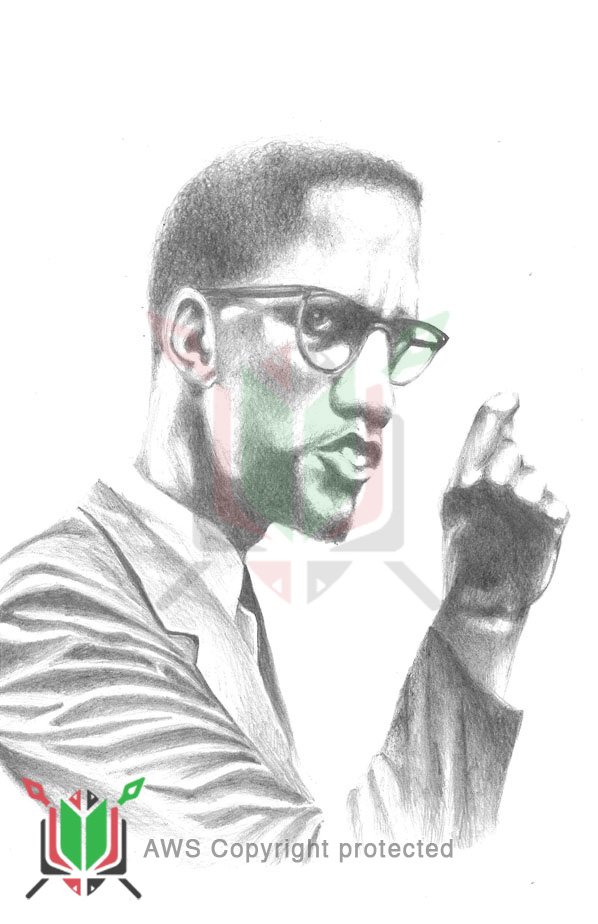
Malcolm X (1925-1965)
Activist, NOI, Organization of Afro-American Unity, Black Nationalism, Pan-Africanism
“The media’s the most powerful entity on earth. They have the power to make the innocent guilty and to make the guilty innocent, and that’s power. Because they control the minds of the masses”. – Malcolm X
Birth and Early Years
He may have been born Malcolm Little in Omaha, Nebraska but he was never destined to be a “little” for very long. Outside of his immediate family very few persons knew him as Little due to the fact that he became infamous as a Minister in the Nation of Islam. Malcolm changed his last name to X as a show of support to his African ancestors. Not knowing his Ancestral African name and not wanting to use his given European monike, he opted to use the mark X as his last name. Although his life was cut short, Malcolm X became one of the most well-known Civil Rights leader of the 20th century.
Malcolm Little, aka Malik Shabazz, but most popularly known as Malcolm X was born in Omaha, Nebraska on May 19, 1925. After the murder of his father when he was six years old, and his mother hospitalized in a mental institution during his formative years, Malcolm spent his teenage years moving from one foster home to another. Most foster homes were not strictly monitored and there were many reports of children being extremely abused, particularly those of African descent. The impact of his experiences then may have been the contributing factors why he lacked the basic educational skills as reading and writing. Due to the lack of these necessary skills, he was unable to acquire a payable job and he spent his teenage years “hustling” (a type of basic entrepreneurship), dealing drugs and even stealing in order to survive. As a result of his actions he was arrested, tried and sentenced to serve ten years in prison.
Harlem has always been the “American mecca” for “black activism” and freedom of expression, this may have been the reason Malcolm moved to New York as soon as he could escape living in foster homes in 1943. In Harlem, a significantly black neighborhood, Malcolm got involved in varying illegal activities which culminated in him being charged with burglary and sentenced to 10 years in prison. He was incarcerated at the Charlestown state prison, Virginia, and later on in the Massachusetts State prison where he converted to Islam. His incarceration combined with his conversion to Islam had a catalyst needed to change Malcolm’s fortunes as they effected a positive influence in his educational, social psychological demeanor. He went into prison as a confused youth but left seven years later as a confident man.
Prison, Education, and the Nation of Islam
The incarceration of blacks at this particular era was happening at an alarming rate and in prison, (it is well documented) in order to assist in their survival, convicts formed or joined “gangs” based on their ethnic or religious persuasions. Malcolm formed an affiliation with the Black Muslims and the Nation of Islam (NOI), which at that time was recruiting and mentoring young black males to not only identify with, but also be proud of their color. He served seven years of his sentence, was paroled in 1952, his rhetoric aggression towards white supremacy gained impetus and his popularity within the organization grew. The name Malcolm X was continually on the lips of both blacks and whites and he became the most famous member of the NO! In the diaspora. Malcolm may have inherited or developed his perspective on civil liberties as his deceased father was a well-known purporter of Civil Rights. Due to him being shunted from one foster home to another, Malcolm was not well educated during his early years. After his conversion to Islam in prison and understanding the necessity of a good education, he was determined to improve his knowledge base and spent the next seven years teaching himself. He utilized the prison library and with the help of the more intelligent muslim prison population, he amassed a great deal of knowledge in the arts and history and any other genre to which texts were available, most of all he studied the Muslim religion as it pertained to the Nation of Islam. Malcolm X would sneak out of bed after lights-out in the low security prison, sit under the dimmed light in the passage between cells and soak up as much knowledge as he could. By the time he got out of prison he was not only an avid, proficient reader; he was extremely versed in the doctrines of the Nation of Islam.
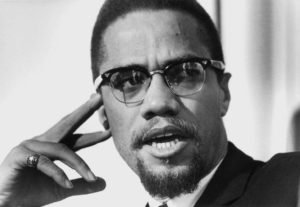
It is difficult to separate the education, religion and incarceration of Malcolm X as these three aspects of his life are closely interlinked. With that being said, one may also say that “imprisonment” was an unintentional but positive impact on the life of Malcolm X. It was in Prison that he converted to Islam, educated himself and escaped the life of petty crime that he had been living during his teenage years. During his first few years of incarceration Malcolm was given the alias “satan” as he railed against the Christian Deity daily at every opportunity he got. While others prayed for release he “cursed” the white man’s God, the Bible and everything that was considered religious or represented Christianity. His siblings wrote, visited and spoke to him about the Muslim religion him as often as they could and he listened. They introduced him to the doctrines of Elijah Muhammad, who as the acclaimed Leader of the Black Muslims, was a welcome alternative to the “white” God. Malcolm embraced the teachings of Muhammad in that the white man was the devil, that throughout history they have continually strived to manipulate, oppress and exploit other ethnic groups economically, culturally and socially. These ideas were more conducive to his beliefs and Malcolm absorbed every morsel of Elijah Muhammad’s teachings.
The more engrossed he became in Muhammad’s doctrine, the more his confidence grew and he started to develop pride in not only himself but also in his ethnicity. He became a proponent of Black Nationalism, realized his educational short-comings and started on a mission to improve himself intellectually and socially. Upon recognition of his inadequacies in both reading and writing, the first book he borrowed from the library was a dictionary. Being incarcerated, he had time to copy the whole book which he did systematically, page by page on a daily basis. In one of his speeches he explained the system he used to teach himself reading: “In my slow, painstaking, ragged handwriting, I copied into my tablet everything printed on that first page, down to the punctuation marks. I believe it took me a day. Then aloud, I read back, to myself, everything I’d written on the tablet. . . . I woke up the next morning, thinking about those words — immensely proud to realize that not only had I written so much at one time, but I’d written words that I never knew were in the world. ——-could for the first time pick up a book and read and now begin to understand what the book was saying.”
Life after Prison
After being paroled in 1952, Malcolm Little rose in the NOI ranks to become a Muslim minister and human rights activist. He was fearless in his criticism of ‘white supremacists” and tireless in his advocacy for the rights of blacks throughout the diaspora. Malcolm dropped the “Little” from his name in favor of “X” which was (symbolic of) used as a symbol of his “lost” African name. As a Muslim minister, he was in no way reticent when it came to exposing the “atrocities” meted out to blacks by white Americans/Europeans. His unabashed criticisms of, and suggested retaliatory actions to guilty whites were seen by some as fostering racism and violence. This did not endear him to the masses, he gained popularity among one sector and notoriety in another. He became a marked man who was secretly being watched by all sectors of society to include the government and his very own organization, Nation of Islam. He was viewed favorably as an ardent supporter of Elijah Muhammad and was rewarded by being made a Minister and public speaker for the NOI during the Civil rights movement. Malcolm was proud of his achievements and with his growing self-esteem. He did not hold back with shining the spotlight on himself, informing the public of the successful projects in which he was involved, most notable the free drug rehabilitation program for colored/black youths. He maintained his position as chief spokesman of the movement for 12 years.
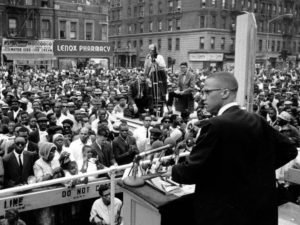
Malcolm X addresses a rally in Harlem in New York City on June 29, 1963.
While the civil rights movement set about advocating for racial integration, Malcolm dissented and became an avid proponent of Black Supremacy calling for racial separation in regards to black and white Americans. His controversial rhetorics gained Malcolm the interest of the Federal Bureau of Investigation (FBI) which was secretly investigating the NOI for alleged links to Communism. His open criticism of the social and political divide was considered a veiled threat hinting at the rejection and overthrow of American democracy.
Malik el-Shabazz
Eventually, Malcolm began questioning some of the teachings/philosophies of the Nation of Islam and his enthusiasm began to diminish.By the beginning of the 60s, he started thinking critically and became disenchanted not only of some aspects of the NOI, but more so of its leader Elijah Muhammad. He deplored the time he invested in the movement which he considered to be largely unproductive, however, he was still committed to the Islamic faith and joined another branch Sunni Islam. He immersed himself into his new religion and upon completion of the Hajj, Malcolm changed his perspective and did a 180 degrees turn on the concepts of the NOI. The Hajj is explained as one of the five concepts on which Islam was established. It is a pilgrimage that all healthy Muslims are required to complete at least once in their life as it is seen as a chance to not only strengthen their faith but also to purge them of past sins and the beginning of a new clean life. He now embraced racial integration, decried racism and changed his name to el-Hajj Malik el-Shabazz, the name he later gave to his wife and children. However, the name Malcolm X remained with him and still is the most popular by which he was known to the public even after his death, it is the name that is immortalized in history. There are many individuals who do not have any idea of the man Malik el-Shabazz, but can tell you a lot about Malcolm X.
On his return from a short trip to/ across Africa, as Malik el-Shabazz he renounced the Nation of Islam and founded the Muslim Mosque Inc., (MMI) and the Organization of Afro-American Unity (OAAU) in recognition and support of Pan-Africanism, which resulted in friction between Malcolm and the NOI. Malcolm was not afraid to live up to his principles and to choose the path he believed was more conducive to the upliftment of the African people. In his words: “A man who stands for nothing will fall for anything”. Such a profound statement.
Death
The “conflict” with the Nation of Islam increased and in 1964 he received numerous death threats which he tried to ignore. The following year Malcolm was preparing for to address a meeting organized by the OAAU in Manhattan on February 21, when he was ambushed and assassinated by three members of the Nation of Islam; Thomas Hagan, Thomas Johnson and Norman Butler. They were each given life sentences with the possibility of parole. However, each had to serve a mandatory 20 years in prison before becoming eligible for parole. After the assassination of Malcolm X, it was rumored that his “execution” was the result of a conspiracy or conspiracies by the hierarchy of the Nation of Islam, law enforcement agencies or by a combination of both. This rumour persists up to the present time. Malcolm Little aka Malik el-Shabazz, aka Malcolm X was a promising young Black Nationalist, Pan-Africanist, Civil Rights Activist when his life was unwarrantedly snuffed out at the very young age of 39 years.
Malcolm X Quotes
Some thought that his speeches were inflammatory but for the oppressed blacks, there was hope of better social and economical conditions, hope of equal opportunities for the African race which translate simply in hope of a better future for all minority groups but particularly for Black people. The profundity of his quotes mirror his thoughts and the deep regard in which he held his people. They also reflect his experiences, his aspirations for African- Americans and his frustrations with those who were in authority then.
The future belongs to those who prepare for it today.
Education is the passport to the future, for tomorrow belongs to those who prepare for it today.
I’m for truth, no matter who tells it. I’m for justice, no matter who it’s for or against.
Malcolm X, 1925-1965
“You’re not to be so blind with patriotism that you can’t face reality. Wrong is wrong, no matter who does it or says it.”
“If you have no critics you’ll likely have no success.”
“Don’t be in a hurry to condemn because he doesn’t do what you do or think as you think or as fast. There was a time when you didn’t know what you know today.”
“You can’t separate peace from freedom because no one can be at peace unless he has his freedom.”
“A wise man can play the part of a clown, but a clown can’t play the part of a wise man.”
“Of all our studies history is most qualified to reward our research”.
”All of our experiences fuse into our personality. Everything that ever happened to us is an ingredient.”
“I’m for truth, no matter who tells it. I’m for justice, no matter who it’s for or against.”
“Children have a lesson adults should learn, to not be ashamed of failing, but to get up and try again.”
We hope that you found the information above interesting and informative. All of the content used on our website is original and created especially for the educational uplifment of our visitors. This includes our images such as the sketch you see above created exclusively for our website. Please visit our online store to purchase items commemorating the great honorable Malcolm X and other African Warrior Scholars. Thank you for visiting!
Abibifahodie,
The AWS Team
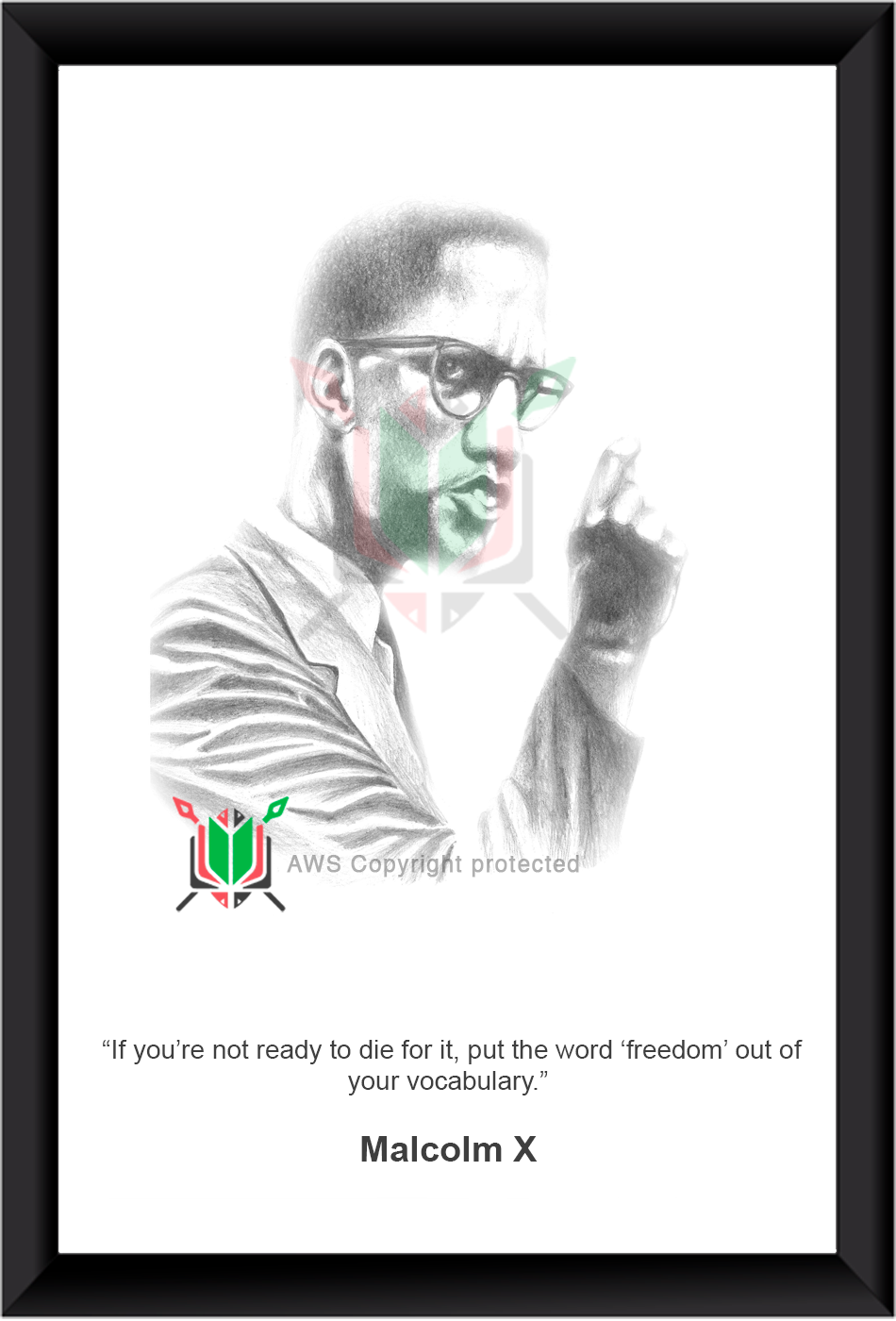
Malcom x Custom Quote Sketches
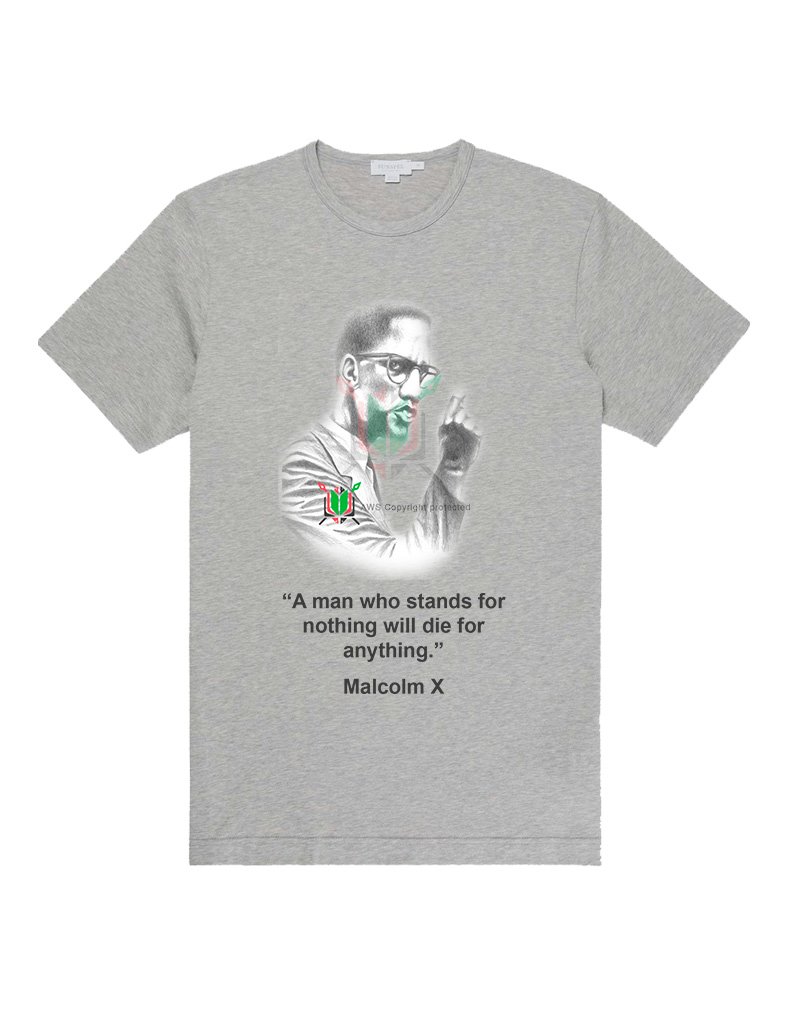
Malcom x Custom Quote T-Shirts

